|
|
|
Sort Order |
|
|
|
Items / Page
|
|
|
|
|
|
|
| Srl | Item |
| 1 |
ID:
158714
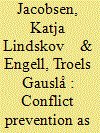

|
|
|
|
|
| Summary/Abstract |
Contemporary conflict prevention depends on information gathering and knowledge production about developments within the borders of a state, whose internal affairs have been deemed precarious by external actors. The international community, especially the United Nations (UN), calls this early warning and early action. However, for governments whose affairs are considered in need of monitoring, preventive endeavours—and the knowledge production they entail—can be seen as ‘early aggression’. In this article, we argue that seeing knowledge production as having power effects reveals contemporary conflict prevention as an interventionary practice. Through an analysis of the international community's preventive diplomacy vis-à-vis Burundi (2015–2016) we highlight three unintended power effects: privileging the UN's knowledge production created resistance to international involvement from the Government of Burundi, it led to a change in patterns of violence and to a backlash against the institutionalization of international monitoring beyond Burundi, and it enabled arguments for further, more forceful, intervention possibilities. This framing enables us to understand the recent return to conflict prevention not as a retreat from liberal interventionism, but as a pragmatic response to its purported crisis. Crucially, although conflict prevention falls short of military intervention, it nonetheless leaves important interventionist footprints.
|
|
|
|
|
|
|
|
|
|
|
|
|
|
|
|
| 2 |
ID:
138070
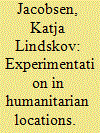

|
|
|
|
|
| Summary/Abstract |
Amid good intentions, such as providing humanitarian assistance to refugees, the use of biometric technology in humanitarian refugee management may entail various risks for the implicated refugee populations. Drawing on insights from science and technology studies, this article introduces a distinction between risks stemming from technology failure and risks stemming from successful uses of biometric technology. The article thus departs from the literature in which technology failure has been in focus by showing that analysing the effect of technology success adds an important dimension to our analysis of the range of risks that may emerge in the context of humanitarian technology uses. The usefulness of this distinction is then illustrated through an analysis of the use by the United Nations High Commissioner for Refugees (UNHCR) of iris recognition in the repatriation of Afghan refugees; besides risks of failure at the implementation stage, risks also emerged once refugees had successfully registered their biometric data with UNHCR. To recognize how humanitarian refugee biometrics produces digital refugees at risk of exposure to new forms of intrusion and insecurity, we need to appreciate how successful technology can have critical implications arising from how technology is constituted in and constitutive of social phenomena.
|
|
|
|
|
|
|
|
|
|
|
|
|
|
|
|
| 3 |
ID:
189099
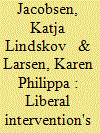

|
|
|
|
|
| Summary/Abstract |
Liberal intervention actors often understand Russian engagements in Africa through a great power vacuum logic. This logic sees Russian influence as resulting from Russia filling a vacuum where other (notably liberal) interveners downscale. This article unpacks that vacuum logic and explores its consequences and effects. On the one hand, the vacuum logic is central to representations of Russia as an entirely external ‘other’, which contribute to constituting a ‘liberal’ intervention approach and community. On the other hand, exploring Russia's presence in the Central African Republic (CAR) and in Mali challenges this representation, as examples of pragmatic co-existence between Russian and liberal actors become visible. The cases of Mali and CAR also illustrate other challenge, including how the vacuum logic dismisses host state agency and renders longstanding critique of liberal intervention seemingly unnecessary, legitimizing a one-directional critique of Russia's presence in Africa. Failing to appreciate the constitutive and dismissive effects of this great power vacuum logic risks confronting liberal interveners in ways that make them ill-equipped to address critical shortcomings of their own approach. Leaving shortcoming unaddressed may inadvertently provide further grounds for (rather than counter) Russian influence, where Russian actors may take advantage of anti-colonial sentiments and security shortcomings.
|
|
|
|
|
|
|
|
|
|
|
|
|
|
|
|
| 4 |
ID:
154696
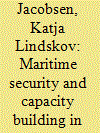

|
|
|
|
|
| Summary/Abstract |
It is widely acknowledged that maritime security in the Gulf of Guinea is a highly complex phenomenon involving a variety of issues (legal deficiencies, inadequate military equipment, and challenges like corruption, political unrest and youth unemployment) as well as a multiplicity of external responders. To make sense of the impact that external actors have when they address this complex problem through various maritime capacity building endeavours, this article argues that there is a need to understand the attractiveness of capacity building vis-à-vis the widely acknowledged need for a comprehensive approach, as well as the difficulties of translating the potential for comprehensiveness into practice (as important aspects of the problem remain largely unaddressed). Further, it is argued that it is important to appreciate that even if these gaps – i.e. the aspects that maritime capacity building currently leaves unaddressed – represent a ‘failure’ to deliver a comprehensive response, they are at the same time illustrative of how the maritime capacity building activities of various external actors also ‘succeed’ in having an impact on this regional security landscape – for instance, by influencing how certain aspects of this multifaceted problem are prioritised, whilst others are only marginally addressed, if at all.
|
|
|
|
|
|
|
|
|
|
|
|
|
|
|
|
| 5 |
ID:
168420
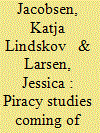

|
|
|
|
|
| Summary/Abstract |
How, as a sub-set of maritime security, can piracy studies contribute with conceptual insights of relevance to the field of international security governance and international politics more broadly? To answer this question the article examines, with reference to critical intervention studies, how responses to Somali piracy have had constitutive effects, notably ‘back onto’ the intervening actors themselves. More specifically, three themes are examined: regulation (law), structures (institutions) and practices (actors), each of which highlights a distinct sense of contingency, which both characterizes contemporary security governance at sea and makes ‘the maritime’ an interesting domain for the study of constitutive effects related to the making of intervention actors. In light of this, the article argues that studying ‘the maritime’ can offer conceptual insights to the constitutive effects of counter-piracy interventions that may prove relevant to broader debates about governance and security in a changing world order.
|
|
|
|
|
|
|
|
|
|
|
|
|
|
|
|
| 6 |
ID:
163053
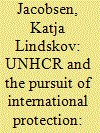

|
|
|
|
|
| Summary/Abstract |
Better management and new technological solutions are increasingly portrayed as the way to improve refugee protection and enhance the accountability of humanitarian actors. Taking concepts of legibility, quantification and co-production as the point of departure, this article explores how techno-bureaucratic practices shape conceptions of international refugee protection. We do this by examining the evolving roles of results-based management (RBM), biometrics and cash-based interventions as ‘accountability technologies’ in the United Nations High Commissioner for Refugees’ international protection efforts. The article challenges the assumption that these technologies produce a seamless form of accountability that is equally attentive to donor requests and the protection needs of refugees. By focusing on how the constitution of these techniques as ‘accountability solutions’ shapes conceptions of the very meaning of protection (ie the problem to be addressed), we also show what dimensions of protection get omitted in this co-production of technical solutions and socio-political problems.
|
|
|
|
|
|
|
|
|
|
|
|
|
|
|
|
|
|
|
|
|